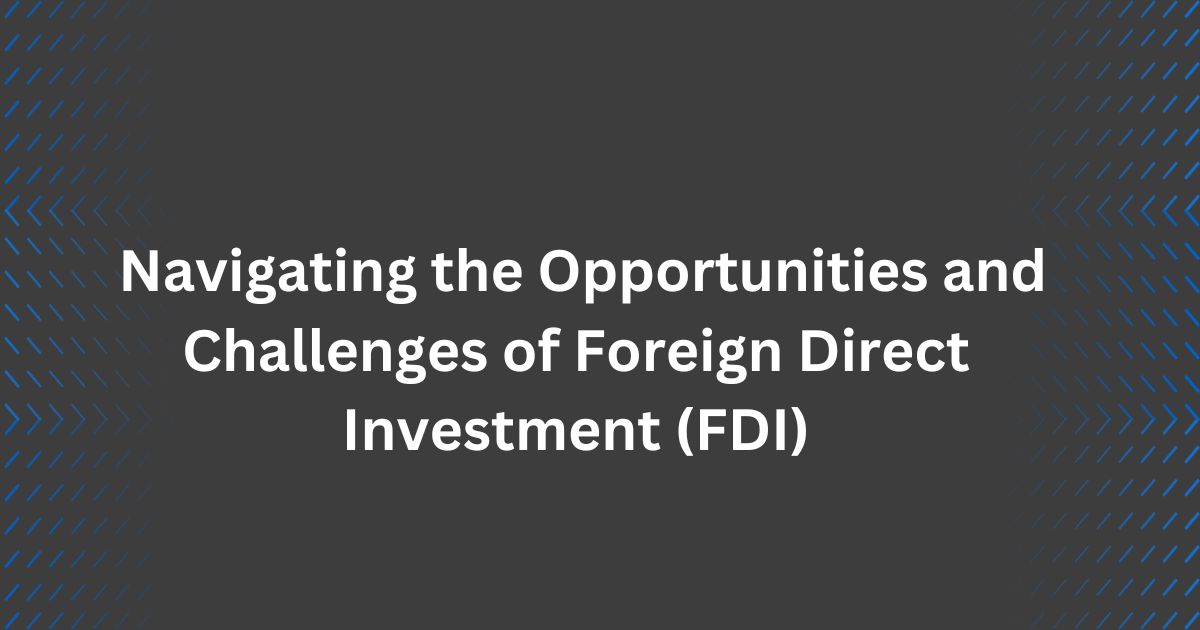In today’s interconnected global economy, Foreign Direct Investment (FDI) stands as a pivotal force shaping the economic landscapes of both investing and host countries. While FDI brings forth a multitude of opportunities for economic growth and development, it also presents a spectrum of challenges that necessitate careful consideration and management by policymakers and investors alike.
Advantages of FDI:
Foreign Direct Investment serves as a catalyst for economic growth, injecting capital, expertise, and innovation into host economies. By fostering the expansion of businesses and industries, FDI stimulates productivity, drives technological advancement, and opens up new avenues for market expansion.
One of the most significant advantages of FDI lies in its role as a conduit for technology transfer. Multinational corporations (MNCs) bring with them advanced technologies, management practices, and skills that can uplift local industries, enhance workforce capabilities, and foster a culture of innovation in host countries.
Job creation stands as another key benefit of FDI. Through direct employment opportunities in newly established or expanded businesses and indirect job creation in supporting industries, FDI contributes to poverty alleviation, social stability, and human capital development in host communities.
Moreover, FDI facilitates market access for both investors and host countries. Foreign investors gain entry into new markets, while host countries benefit from increased trade flows, technology diffusion, and enhanced competitiveness in the global marketplace.
Additionally, FDI often spurs infrastructure development in host countries, particularly in sectors such as telecommunications, energy, and transportation. These investments in infrastructure not only improve connectivity and logistics but also lay the foundation for sustained economic growth and development.
Challenges and Drawbacks of FDI:
However, alongside the manifold benefits, Foreign Direct Investment brings forth a set of challenges that demand prudent management and regulatory oversight.
Chief among these challenges is the risk of dependency on FDI. Overreliance on foreign investment can render host countries vulnerable to external shocks, limiting their economic sovereignty and policy autonomy.
Economic volatility presents another significant challenge associated with FDI. Fluctuations in global economic conditions can lead to sudden shifts in investment patterns, resulting in instability and uncertainty in host economies.
Moreover, profit repatriation by multinational corporations can reduce funds available for reinvestment in host countries, potentially exacerbating income inequality and hindering sustainable development efforts.
Technological dependence is another concern, as host countries may become reliant on foreign technologies, stifling the development of indigenous capabilities and innovation ecosystems.
Labor exploitation poses a moral and ethical challenge associated with some FDI projects. In pursuit of cost efficiencies, foreign investors may engage in practices that compromise labor rights and perpetuate social inequalities.
Environmental concerns also loom large, as inadequately regulated FDI projects can lead to environmental degradation, pollution, and habitat destruction, jeopardizing ecosystems and public health.
Furthermore, excessive FDI, particularly in strategic industries, may raise concerns about loss of sovereignty and control over key economic sectors, fueling apprehensions about foreign influence and economic dominance.
In conclusion, while Foreign Direct Investment holds immense potential for fostering economic growth and development, its realization hinges on effectively navigating the associated opportunities and challenges. By adopting a balanced approach that harnesses the benefits of FDI while mitigating its drawbacks through robust policies, regulations, and stakeholder engagement, countries can pave the way for sustainable and inclusive prosperity in an increasingly interconnected world.


1 comment